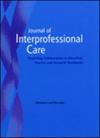疗养院实践中的跨专业教育项目评估:混合方法多案例研究。
IF 2.6
3区 医学
Q3 HEALTH CARE SCIENCES & SERVICES
引用次数: 0
摘要
研究表明,跨专业合作(IPC)和教育(IPE)有可能为疗养院的居民提供更好的护理,但其实施却充满挑战。本研究评估了共同设计的 IPE 项目的实施情况,并调查了医护学生的学习内容和方式,以及影响他们学习的因素。研究采用混合方法对三个案例进行评估,学生参与了 IPE(n = 72)。研究包括前测和后测、焦点小组和访谈(n = 54)。结果表明,学生发展了跨专业技能和以人为本的实践,这一点在访谈中得到了学生和教育者的证实。此外,研究结果表明,其他人也从该计划中学到了东西。研究强调了工作场所的学习文化、资源、IPC 的组织基础设施以及教育者嵌入护理组织对学习成果的影响。研究结果表明,现有的 IPC 可以激发和加速 IPE,也可以激发或加速现有的 IPC。由于这些有利因素是相互关联的,因此在组织的各个层面同时解决这些因素可能会加快发展一个为 IPE 做好准备的组织。本文章由计算机程序翻译,如有差异,请以英文原文为准。
Evaluation of an interprofessional educational program in nursing home practice: a mixed methods multiple-case study.
Research has shown that interprofessional collaboration (IPC) and education (IPE) may potentially lead to better care for residents in nursing homes, but their implementation is challenging. This study evaluates the implementation of a co-designed IPE program and investigates what and how healthcare students learn and what factors influence their learning. A mixed-methods approach was used to evaluate three cases, with student participation in the IPE (n = 72). The study comprised pre- and posttests, focus groups, and interviews (n = 54). The results indicate that students developed their interprofessional skills and person-centered practice, as confirmed by both the students and educators in the interviews. Additionally, the findings suggest that others also learned from the program. The study emphasizes the influence of workplace learning culture, resources, organizational infrastructure for IPC, and educators' embeddedness in the care organization on learning outcomes. The findings suggest that IPE is stimulated and accelerated by existing IPC and can stimulate or accelerate existing IPC. As the enabling factors are interrelated, addressing them simultaneously on all organizational levels may result in the faster development of an IPE-ready organization.
求助全文
通过发布文献求助,成功后即可免费获取论文全文。
去求助
来源期刊

Journal of Interprofessional Care
HEALTH CARE SCIENCES & SERVICES-
CiteScore
5.80
自引率
14.80%
发文量
124
审稿时长
6-12 weeks
期刊介绍:
The Journal of Interprofessional Care disseminates research and new developments in the field of interprofessional education and practice. We welcome contributions containing an explicit interprofessional focus, and involving a range of settings, professions, and fields. Areas of practice covered include primary, community and hospital care, health education and public health, and beyond health and social care into fields such as criminal justice and primary/elementary education. Papers introducing additional interprofessional views, for example, from a community development or environmental design perspective, are welcome. The Journal is disseminated internationally and encourages submissions from around the world.
 求助内容:
求助内容: 应助结果提醒方式:
应助结果提醒方式:


